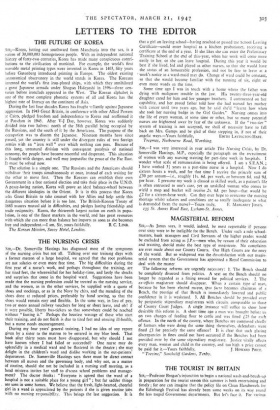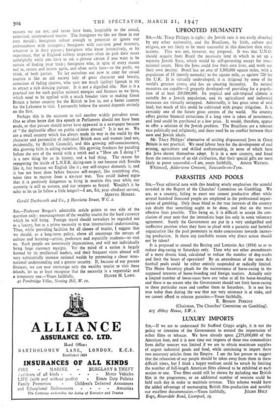THE TOURIST IN BRITAIN
Sts,—Professor Brogan's injunction to begin a national wash-and-brush-up in preparation for the tourist season this summer is both entertaining and timely ; for one can imagine that the policy file on Clean Handtowels for the Edinburgh Festival has already been some weeks on its way round the less torpid Government departments. But let's face it. For various reasons we are not, and never have been, hospitable to the casual, uninvited, unintroduced tourist. The foreigners we like are those in our own mould ; foreigners robust enough to penetrate or ignore our awkwardness with strangers ; foreigners with cast-iron good manners, whatever is in their purses ; foreigners who know instinctively, or by experience, that in England railway inspectors often do pick their noses unhelpfully while you have to ask a.private citizen if you want to be certain of finding your train ; foreigners who, in spite of every reason not to, return and return again, and often settle here—to the profit, we think, of both parties. To lay ourselves out now to cater for casual tourists is like an old society lady of great character and beauty, conscious of fading charms, who uses too much (utility) lipstick to try to attract a rich dancing partner. It is not a dignified role. Nor is it a practical use for such surplus national energies and finances as we have, which need to be applied with a much broader view to making Great Britain a better country for the British to live in, not a better country for the Lebanese to visit. I personally believe the second depends entirely on the first.
Perhaps this is the occasion to nail another widely prevalent error. One so often hears that this speech in Parliament should not have been made, or that picture should never have appeared in a newspaper because of " the deplorable effect on public opinion abroad." It is not so. We are a small country which has always made its way in the world by the character and personality of individual British men and women (and not, incidentally, by British Councils), and this growing self-consciousness, this growing faith in selling ourselves, this growing fondness for parading before the rest of the world with a smirk and a "How am I doing ? " is a new thing for us in history, and a bad thing. The reason for repapering the inside of L.N.E.R. dining-cars is not because rich Swedes like it, but because we English like it ; our self-respect demands it, and it has not been done before because self-respect, like everything else, takes time to recover from a six-year war. You could indeed argue that it is positively dangerous to bring in tourists this year while our austerity is still so austere, and Our tempers so frayed. Wouldn't it be safer to let us lie fallow a little longer? —I am, Sir, your obedient servant,
MERVYN HORDER.
Gerald Duckworth and Co., 3 Henrietta Street, W.C. 2.



































 Previous page
Previous page